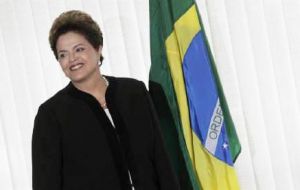MercoPress. South Atlantic News Agency
Rousseff visits Uruguay to sign 12 accords on trade, integration and technology
 It’s the Brazilian president third overseas trip since taking office in January
It’s the Brazilian president third overseas trip since taking office in January Brazilian president Dilma Rousseff arrives Monday in Uruguay, the third country she will be visiting after China and Argentina, since taking office last January first. The two countries are founding full members of Mercosur and Brazil is Uruguay’s main trade partner.
Ms Rousseff and her Uruguayan peer Jose Mujica are scheduled to sign twelve bilateral agreements which gives an idea of the “close and reciprocally beneficial bilateral relation between the two countries and leaders”, said Brazilian ambassador in Montevideo, Joao Carlos Souza-Gomes on anticipation of the eight hour visit.
The ambassador described bilateral relations as “excellent” and underlined the new approach to the dozen agreements which includes scientific and technology issues to the more traditional referred to trade and integration.
“The fact that when President Rousseff took office President Mujica went to Brazil with a delegation of all Uruguayan political parties including those from the opposition had a most positive impact in support of the bilateral relations and agreements to be signed Monday and in the future”, said Ambassador Souza-Gomes.
President Roussef and her delegation are scheduled to first visit one of Uruguay’s scientific development poles and later will travel to the Foreign Affairs ministry for the signing of the agreements and different bilateral talks between visiting ministers and their Uruguayan counterparts.
“Next May 30, I will have the special satisfaction, as head of State to make by first work visit to Uruguay. On the occasion I will iterate to President Jose Mujica my commitment to the permanent strengthening of our association. Together we will implement the strategic character of our relation with new and concrete initiatives”, said a brief message from President Rousseff.
The two presidents are scheduled to discuss several initiatives and infrastructure projects which are geared to make possible an integrated development of northern Uruguay and the southern half of Rio Grande do Sul state, among which the construction of a new bridge, railway interconnection, alternating complementary power links and the launching of a Uruguay-Brazil water way along border lagoons and fluvial resources connecting with the Atlantic ocean.
Besides infrastructure the two countries will expand their cooperation to science, technology and innovation including digital television, interactive connectivity with the purpose of granting universal access to wide band and advanced software and nano-technology.
Brazil has consolidated as the main destination for Uruguay’s exports, particularly manufactured goods and also the country’s main provider. Bilateral trade in 2010 was over 3 billion US dollars, up 19% from the previous year and is relatively balanced for both sides.
“The alliance between Uruguay and Brazil is not because of a geographic circumstance, much less a bureaucratic construction, we have common and complementary interests”, said the Brazilian president.
“Our societies share values that are supported in solid and caring historic links. From there comes the fundamental strength that supports our common integration project both bilateral and regional”, added Ms Rousseff who underlined the “positive historic moment of solid economic growth and democratic stability undergone by Uruguay and Brazil which gives an additional push to our association”.
President Rousseff said that in support of these initiatives and ensure their concretion in 2010 “we created the Brazil/Uruguay Bilateral Commission for Strategic Planning and Productive Integration, CBPE” to deal with infrastructure plans and cooperation.
“Integration of our countries can’t be limited to the acquisition of Uruguayan assets by Brazilian companies but by a productive articulation of our economies in the future, and for that reason focused on innovation and technology development”, underlined Ms Rousseff who praised Uruguay’s political stability, strong legal system and qualified labour force.
The Brazilian president in her message also mentioned a common strategy in regional and global foreign policies with the purpose of confirming an international multi-polar system.
For this “we are working in the constant strengthening of unity and presence of Mercosur. This has been done with the elimination of the double charge and prevalence of the Common External Tariff, to facilitate trade among members and sponsoring of the Structural Convergence Fund to alleviate the region’s asymmetries.
Ms Rousseff also mentioned the two countries commitment with the Union of South American Nations, Unasur and with the pending UN reforms, particularly the Security Council to guarantee an improved representation. Uruguay and Brazil are also main contributors to the UN Haiti Stabilization Mission in Haiti.
“Brazil and Uruguay have an enviable solid heritage of democracy, economic growth with inclusion which is a formidable tool to overcome the challenges of development and creating in South America the same example of peace, prosperity and cooperation”, concluded the presidential message.




Top Comments
Disclaimer & comment rulesCommenting for this story is now closed.
If you have a Facebook account, become a fan and comment on our Facebook Page!